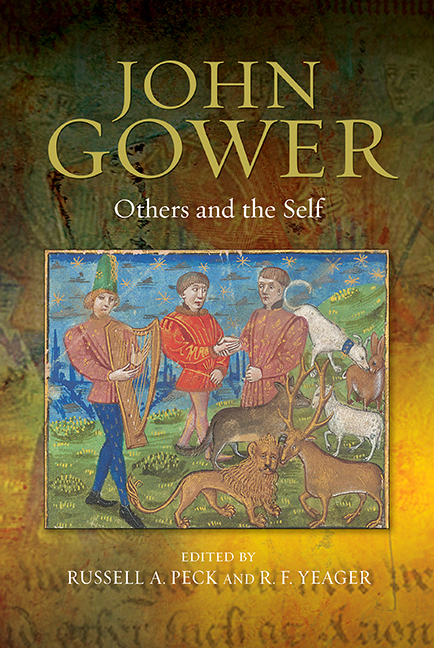Book contents
- Frontmatter
- Contents
- List of Illustrations
- Abbreviations
- Introduction
- PART I KNOWING THE SELF AND OTHERS
- 1 The Materiality of Cognition in Reading, Staging, and Regulation of Brain and Heart Activities in Gower's Confessio Amantis
- 2 The Sound of My Voice: Aurality and Credible Faith in the Vox Clamantis
- 3 “Noght withoute peine”: Chastity, Complaint, and Lucrece's Vox Clamantis
- 4 Reading Faces in Gower and Chaucer
- 5 Gower and Mortality: The Ends of Storytelling
- PART II THE ESSENCE OF STRANGERS
- PART III SOCIAL ETHICS, ETHICAL POETICS
- Bibliography
- Index
- VOLUMES ALREADY PUBLISHED
3 - “Noght withoute peine”: Chastity, Complaint, and Lucrece's Vox Clamantis
from PART I - KNOWING THE SELF AND OTHERS
Published online by Cambridge University Press: 30 April 2019
- Frontmatter
- Contents
- List of Illustrations
- Abbreviations
- Introduction
- PART I KNOWING THE SELF AND OTHERS
- 1 The Materiality of Cognition in Reading, Staging, and Regulation of Brain and Heart Activities in Gower's Confessio Amantis
- 2 The Sound of My Voice: Aurality and Credible Faith in the Vox Clamantis
- 3 “Noght withoute peine”: Chastity, Complaint, and Lucrece's Vox Clamantis
- 4 Reading Faces in Gower and Chaucer
- 5 Gower and Mortality: The Ends of Storytelling
- PART II THE ESSENCE OF STRANGERS
- PART III SOCIAL ETHICS, ETHICAL POETICS
- Bibliography
- Index
- VOLUMES ALREADY PUBLISHED
Summary
The virtues of pity and chastity dominate Genius’ account of the kingly virtues in Book VII of the Confessio Amantis, but their relationship to one another is not particularly clear. While both might seem at first to be checks on royal rule, Andrew Galloway has argued that in the Confessio, Gower seeks to “redefine pity as a direct expression of power.” Similarly, Yoshiko Kobayashi claims that “Gower assimilated the figure of Pity to the punitive aspect of kingship” in an analysis that examines Gower's work across three languages. In Lordship and Literature: John Gower and the Politics of the Great Household, Elliot Kendall poses chastity as the emblem of a quite different analysis of power: “the exempla of chastity house the poem's most radical assertions of royal obligation,” especially the narrative of Lucrece. While for Kendall, Gower's Confessio as a whole depends upon these forms of obligation to produce the “particularly aristocratic politics” of the noble household, and the Confessio usually valorizes reciprocal relations over magnificence, he still fundamentally agrees with Galloway's reading of Gower's pity: “pity is represented as an instrument rather than a modifier of power, and the defense of pity—even its enactment—is represented by extreme vengeance,” and these representations “render pity a species of magnificence.” While Galloway finds in Gower a “problematic connection of pity and violence,” and Kendall locates in Gower's version of pity “the flaw which reveals the conflicted core of the reciprocalist idea pursued throughout Gower's text” and shows the problem of “negotiations between principles of reciprocity and the treasured keystone of static hierarchy,” I argue that for Gower, pity is a form of the “power over life” that sovereignty claims as the complement to state violence, the “power over death.” This power over life, which Giorgio Agamben locates in his genealogy of modern biopower, is in Gower rooted in the masculine control over sexuality, specifically the virtue of chastity. Pity is thus central to the reading of the exempla of chastity, and rather than being a flaw in Gower's account of the ethics of ruling or directly aligned with violence, is essential to the dynamic apparatus of domination.
- Type
- Chapter
- Information
- John Gower: Others and the Self , pp. 50 - 72Publisher: Boydell & BrewerPrint publication year: 2017

